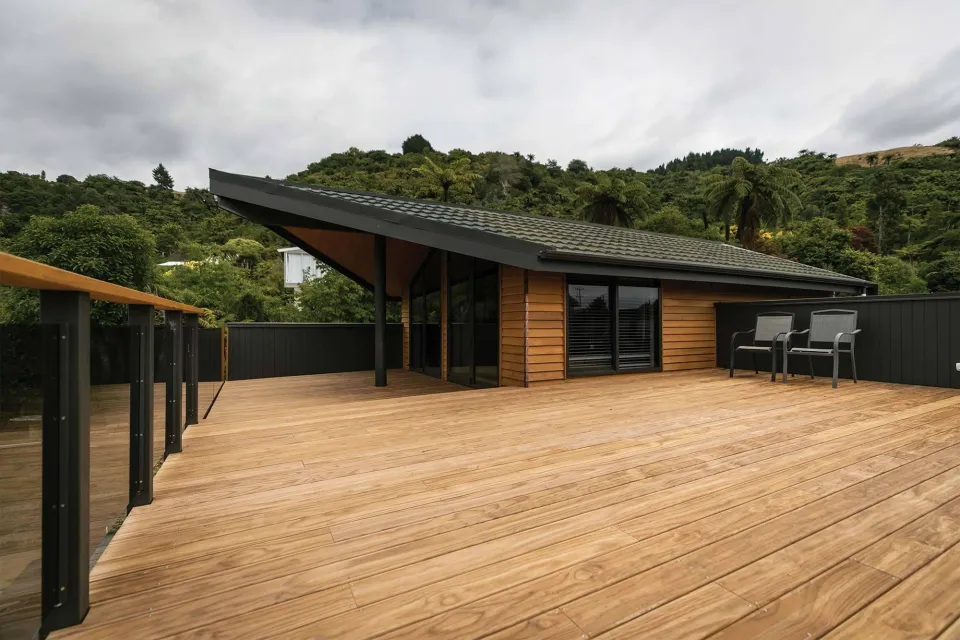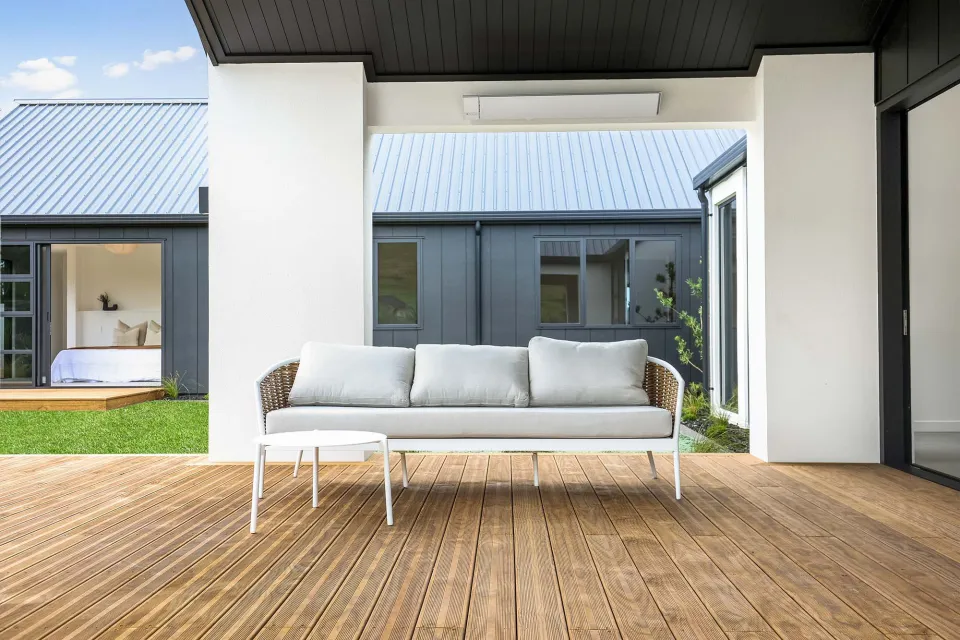-
About
-
Products
- By Timber Product
- Cladding
- Decking
- Joinery
- Screening
- Panelling
- View all
- By Application
- Exterior Cladding / Siding
- Exterior Rain Screen
- Exterior Roofing
- Interior Walls & Ceilings
- Soffits
- Screening, Fins & Battens
- Windows, Doors & Joinery
- Posts & Beams
- Accessories + Samples
- Coatings
- Fixings
- Samples
-
Shop
- Samples
- Timber Samples
- Architectural Sample Box
- View all
- Accessories
- Coatings
- Fixings
- View all
-
Resources
- By Resource Type
- Technical Data Sheets
- Guides & Manuals
- Technical Articles
- Profile Drawings
- View all
- How To
- How To Specify
- How To Install
- How To Maintain
- Projects
- Contact
How to Choose the Best Decking Timber for Your Project
Finding a decking timber which lasts through all weathers – and looks great, too involves several considerations.
Choosing a decking timber can seem overwhelming, with colour tones spanning from Scandi pale to rich brown or black, and both soft and hard wood options on the market.
For homes in New Zealand and Australia, it is important to find timber that can withstand the intensity of the southern sun and the exposure to salt air that many of us enjoy, as well as staying straight and true through wet weather. Looking carefully at your project and considering the following points may help to point you in the right direction.
Space and location
Take a good look at the space where your deck will be built (or your current deck if your project involves replacing existing decking). The surrounding landscaping or garden may factor into the type of deck you want to create, as will its connections to living spaces and exposure to weather.
For a deck that continues seamlessly from a living space, you may want to choose timber that matches the flooring indoors, while a deck that is just for taking in views can be more practical in style, with the hardiness of the timber being the most important factor.
An architectural sun study will help decipher the level of solar exposure for a potential deck space, or, for DIYers, this can be as simple as spending time in the space and noticing how much sun and shade it gets. A deck in direct sun may require more regular upkeep than one that is often in the shade, but similarly a deck in constant shade can require more regular washing to remove mold and mildew.
Use of the deck
Is your deck going to be used solely for enjoying the afternoon sun, does it provide access to a spa or pool, or perhaps you’re building it to give the kids space to ride their scooters and play outdoors?
The use of your deck will also determine the type of timber you need and the surface you want to attain. Grip underfoot can be an important factor for children, especially around water features. With a reeded face, Abodo Vulcan Decking is a good choice for achieving a solid footing. Often known as grip tread, a reeded finish is used for ultimate safety – for example in rural settings, where mud can be an issue, and in educational or community building projects. Other decking products come with a smoother finish, which can help achieve a seamless visual appeal.
Style preferences
A new deck in a non-complementary tone can stick out like a sore thumb, so it pays to take into account existing cladding when you are choosing timbers and finishes. You may also want to consider whether a wider or narrower plank is more pleasing to the eye. Extra wide and extra narrow planks are a growing trend, delivering a modern aesthetic. Again, this may also be matched with interior timber flooring for a seamless look.
Vulcan Decking currently comes in one size – 142x27mm, which is slightly wider than the average decking board. A brown pigmented deck stain will extend and enhance the natural chocolate brown tone of the timber. For a darker or lighter finish, it is also possible to use a tinted penetrating stain, or pick a clear water or oil based stain to achieve a natural and stable silvered look over time.
Sustainability
For a sustainable choice, a softwood should be chosen over a hardwood, as many hardwood varieties are felled from old growth forests, which causes biodiversity loss. Look for a Forest Stewardship Council® (FSC®) certified timber, preferably grown locally to reduce the carbon cost of travel. The FSC® label will prove the sustainable management of the forests.
Vulcan Decking is a particularly sustainable product as it is made using thermally modified plantation pine. Due to this process, fast growing trees can be used to create a lasting, robust timber product with a high level of structural integrity. Vulcan is also treated with an organic preservative system, which repels water and increases its durability without introducing harsh chemicals to the home and the environment.
Budget
As with most things in life, the cheapest choice is not always the best. While savings may be made on the outset, this can be countered by maintenance and replacement costs when products reach end of life prematurely. Choosing a stable timber that will last and one that does not require constant washing and restaining will allow you to enjoy your deck stress-free for longer.
For DIYers and those on a limited budget, Vulcan Decking is easy to install at home, as it does not require pre-drilling. It is also easy to cut and fix, due to the stability of the timber. This may help save on building costs.
Maintenance
No matter what timber product you choose, your deck is sure to need a wash down at least once a year to keep it stable and looking great. An appropriate oil or stain finish will keep water, mold and mildew away, so don’t skimp on the finish.
As Abodo Vulcan Decking is pressure treated with the low VOC organic preservative, it repels both water and insects, which is a boon to those living in termite zones. As it is thermally modified, the product also has reduced resin content, which means it won’t shift and buckle over time, meaning less replacement costs for individual boards.
While there are many options to choose from, it is important to think long term when picking a timber product for your decking. After all, nobody wants to be sitting back and enjoying the view, only to notice that your to-do list is growing.



